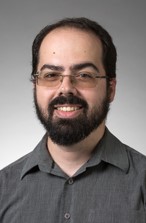Q&A with Diego Aranha, Reviewing Editor, Computer Science Section
This is the next of a series of interviews with people involved with our new Open Access journal, Experimental Results – a forum for short research papers from experimental disciplines across Science, Technology and Medicine, providing authors with an outlet for rapid publication of small chunks of research findings with maximum visibility.

Can you tell us a bit about your background, and what your current research is focused on?
My background, both at the undergraduate and graduate levels, is in Computer Science. I am a researcher in the fields of Cryptography and Computer Security, the science behind designing systems that stay secure under the influence of malicious adversaries. In particular, my current research is within the applied subdiscipline of Cryptographic Engineering, where I study techniques to implement and deploy cryptographic systems efficiently and securely in practice. These encompass more conventional cryptographic systems based on mathematical objects called elliptic curves, and more recent techniques based on error-correcting codes and lattices in an attempt to resist attacks from emerging quantum computers.
What has been your biggest challenge/greatest achievement in your career so far?
I have proposed several techniques for efficiently implementing curve-based cryptography, including fast coordinate systems for representing binary curves (best paper award on the premier conference in my subdiscipline), and ways to accelerate computation of bilinear pairings defined over elliptic curves. However, the results with most real-world impact of my career have been on analyzing the security of the Brazilian electronic voting system. Brazil started adopting paperless voting machines in the 90’s to combat fraud in the paper elections, but the local technical community has always protested against the lack of transparency and auditing measures with the new system. The whole effort took 5 years in total (from 2012 to 2017) and involved participating on restricted tests organized by the national electoral authority in multiple occasions. In these events, we uncovered serious vulnerabilities in the mechanisms protecting ballot secrecy and integrity and even demonstrated a full compromise of the voting software, what sparked a national debate around the security guarantees of the system in which I had the opportunity to contribute with supporting technical evidence.
Why did you decide to become a Reviewing Editor?
I fully believe in the power of peer-reviewing as a cornerstone of the scientific method. Following this ideal, my public profile at Publons already accumulates over 400 reviews for 80 venues (both conferences and journals) and a couple of reviewing awards. My experience as a reviewer serving on over 40 Program Committees and 2 Editorial Boards was probably seen as valuable by the journal, which invited me to serve as a Reviewing Editor.
How will Experimental Results benefit your research field?
Being a fundamentally experimental subdiscipline, the field of Cryptographic Engineering does not have many journals where purely experimental observations can be submitted. Most importantly, there are no venues for publishing negative of reproducibility results, which at best are bundled together with other positive contributions, or delegated to Appendices as a second-class citizen. Experimental Results gives a place for these results to be evaluated and disseminated further.
What excites you about Experimental Results?
Having a new forum for disseminating experimental research is exciting and may even give a little push for scientific practice to get back on track in the long term, if the trend is followed by other scientific venues. Scientists discuss all the time what is wrong with the increasingly bureaucratic and career-oriented publication and peer-reviewing models, with the actual science left in the backstage, so it is refreshing to see new efforts in the right direction. Being able to shape such a recently-born publication venue from the inside is even more exciting!
Find out more about the journal, or submit your research here






